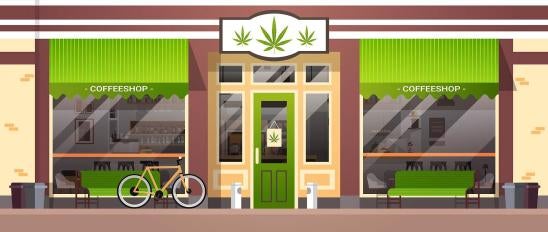It is well known that between New York’s enactment of the Marihuana Regulation & Taxation Act (commonly known as the Cannabis Law) on March 31, 2021 and the slower than anticipated adoption of regulations for adult-use cannabis retailers and implementation of the Act there have been few (and in some geographic areas of the state, no) licensed retail dispensaries opened for the sale of adult-use of cannabis and cannabis related products. As a result, there has been a proliferation of unlicensed retailers (often referred to as “sticker shops” because the sale of stickers comes with the “gift” of cannabis products) selling cannabis products and its derivatives. On May 3, 2023, however, with the conclusion of New York State’s annual budget process and the signing of the state budget bill by Governor Hochul, a series of other bills passed by the state Assembly and state Senate were signed into law by the Governor. Among those additional measures are changes to New York’s Cannabis Law[1] which are intended to curtail, among other activities, the unlicensed sale, distribution and storage of cannabis and cannabis products throughout the state.
As a result of the passage of the recent amendments to the state’s Cannabis Law, owners and landlords of commercial real property in New York need to be aware of the potential dangers of renting space to tenants that engage in any unlicensed cannabis related activities and they must pay close attention to the actual use of their properties by their tenants or risk incurring monetary penalties, liens on their property, legal fees and/or the loss of their tenant.
The recent amendments establish procedures whereby the Office of Cannabis Management (or other state officials with enforcement authority) can now take more robust steps to enjoin and penalize both those engaged in the unlicensed activities as well as those determined to be “conducting or maintaining” such unlicensed activities.[2] In fact, the law now provides that the owner or lessor or a building or premises wherein an unlicensed activity is conducted, maintained, or permitted shall be made defendants in the proceeding.[3] In addition, the actual building or premises involved can be named as a defendant in the proceeding and the Office of Cannabis Management or the state Attorney General may file a notice of pendency against the property pursuant to state’s Civil Practice Law and Rules (CPLR).[4] Furthermore, after being served, the person in whose name the affected real estate is recorded must provide the names of any other owners, lessors and lessees of the building or premises and such parties may thereafter be named defendants in the proceeding.[5]
If a finding is made that the owner of commercial real property has permitted the unlicensed activity a penalty, to be included in the judgment, may be awarded in an amount up to $10,000 for each day it is found that the defendant intentionally permitted the unlicensed activity.[6]
Under certain circumstances, other remedies that OCM and state authorities can take against the defendants include obtaining a preliminary injunction, a temporary closing order, a temporary restraining order and a permanent injunction (which may also result in the closing of the building or premises to the extent necessary to abate the unlicensed activity).[7] Furthermore, a judgment awarding a permanent injunction becomes a lien upon the building or premises, with such lien becoming effective on the date a notice of lis pendens is filed in the office of the clerk of the county wherein the building or premises is located and the statute provides that such lien has priority over any existing mortgage lien[8], a fact that will no doubt result in a default under the property owner’s existing mortgage loan documents.
The Real Property Actions and Proceedings Law (RPAPL) was also amended so that an enforcing agency may require the owner or landlord of real property to commence and prosecute the eviction of a commercial tenant using the property in violation of Section 222 of the state Penal Law relating to the sale of more than three ounces of cannabis or more than twenty-four grams of concentrated cannabis or upon the landlord’s failure to do so, to take such actions itself as if it were the owner or landlord.[9] The revisions to the RPAPL also permit a court to impose a penalty on any owner or landlord not otherwise subject to a civil penalty under the Cannabis Law who is “found to have knowingly permitted such a violation”, a penalty up to 3 times the rent charged for the duration of the violation.[10]
Depending on the property type and tenant mix at any particular property, the unexpected loss of rental income or the early termination of a lease due to a tenant’s unlicensed activity plus the civil penalties that may be assessed against owners and landlords can certainly to lost profits and potentially the loss of the property itself if the owner is unable to pay its debt service on an existing mortgage loan. In addition, existence if such violations, penalties and liens provided by the revised statutes are cause for other potential mortgage loan defaults which could ultimately lead to an owner’s inability to refinance the property and subsequent loss due to foreclosure.
Depending on the property type (e.g., mixed use, retail, or professional) and tenant mix (single tenant, anchor tenant or mixed multi-family and retail) at a particular property, the unexpected loss of rental income or the early termination of a single lease in addition to the risk of civil penalties assessed against owners and landlords can lead to reduced profits and potentially the loss of the property itself due to unanticipated economic losses. In addition, the existence of such violations, penalties, and liens provided by the revised statutes are cause for potential mortgage loan defaults that can ultimately lead to an owner’s loss of the property by virtue of a foreclosure proceeding brought by the owner’s mortgage lender or the inability to service its debt or refinance its property due to lost revenues.
FOOTNOTES
[1] Changes to Cannabis Law are in Part UU of NYS Senate Bill S4006 (pages 144-163)
[2] NYS Cannabis Law Section 16-a
[3] NYS Cannabis Law Section 16-a-1(a)
[4] NYS Cannabis Law Section 16-a-1(b) and (e)
[5] NYS Cannabis Law Section 16-a-1(f)
[6] NYS Cannabis Law Section 16-a-1(h)
[7] NYS Cannabis Law Section 16-a-3-7
[8] NYS Cannabis Law Section 16-a-7(d)
[9] NYS RPAPL Section 715-a-1
[10] NYS RPAPL Section 715-a-2(b)



 i
i


